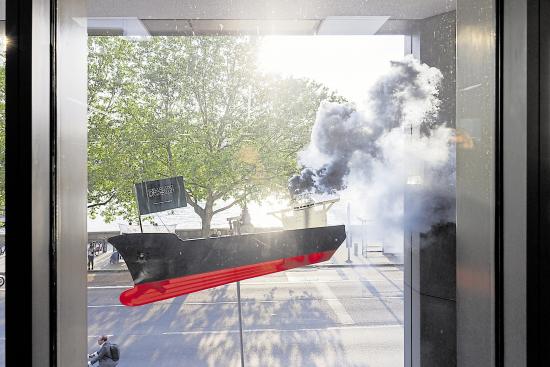On 26 June, Ocean Rebellion brought a puppet oil tanker, belching a vile fog of heavy fuel oil (HFO) smoke, to the headquarters of the International Maritime Organisation (IMO) on Lambeth Road in London. Inside, where the photo above was taken, delegates were sipping drinks on the first day of a conference to revise the IMO’s climate strategy.
Ocean Rebellion were protesting against the fact that the IMO is not aiming to halve shipping greenhouse gas emissions by 2030, but only by 2050: ‘By refusing to tackle shipping pollution ahead of 2030, the IMO is destroying the Ocean and any chance we have of keeping anywhere near to the 1.5C demanded by the Paris Climate Agreement – an agreement brokered by the UN but one which one of its own bodies (UN IMO) can’t be bothered to implement.’
Ocean Rebellion also pointed out that the IMO ‘still refuses to take simple actions like slow steaming, using cleaner distillates instead of HFO, stopping unnecessary shipping or creating a carbon shipping levy.’
- ‘Slow steaming’ means container ships moving at speeds of 12 – 19 knots rather than the usual 20 – 24 knots. This saves on fuel and greenhouse gas emissions: a 10 percent reduction in speed can result in a 19 percent reduction in total average emissions.
- Heavy fuel oil (HFO) is the low-quality, tar-like waste product left behind from crude oil when oil companies distil petrol. You’re not allowed to burn HFO on land because it’s so toxic but the IMO allows it to be burned at sea, despite it poisoning the sea and making it more acidic. If the IMO forced ships to use higher-quality fuels, shipping would have a less harmful impact on the oceans and spills could be more easily cleaned up.
- On the carbon shipping levy, even the World Bank has made a proposal for this. Charging shipping companies for the carbon that their ships emit would encourage them to upgrade their fleets, run them more efficiently and use cleaner fuels and technologies (like sails/wind). The World Bank suggests the funds raised should be used for climate action in the Global South. Ocean Rebellion also call for the scrapping of flags of convenience and the creation of a single standard of employment rights to all seafarers.


